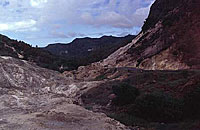Saint Lucia

- © UNESCO/Claude Van Engeland
- Soufrière, pitons management area, Sulfur springs
Saint Lucia joined UNESCO on March 6, 1980. The country is covered by the UNESCO Cluster Office for the Caribbean in Kingston, Jamaica.
The Pitons Management Area, comprised of two volcanic spires rising side by side out of the sea near the town of Soufriere, was added to the UNESCO World Heritage List in 2004.
With regard to intercultural dialogue, Saint Lucia participated actively in the International Year for Commemoration of the Struggle against Slavery and its Abolition, the cultural tourism project “The Slave Route in the Caribbean” and related inventorying and publishing activities.
A project was developed in Des Barras within the Youth Path programme, which develops heritage-friendly tourist activities with the aim of reducing poverty.
The island is an active member of a long-term Sustainable Development in Coastal Regions and Small Islands (CSI) initiative, entitled “Managing Beach Resources and Planning for Coastline Change in the Caribbean”.
The country also contributes to UNESCO's International Programme for the Development of Communication (IPDC). It helped launch ECNETNEWS.COM, a web site connecting the region’s newspapers in an online forum.
Web site connecting the region’s newspapers in an online forum
Project presentation

